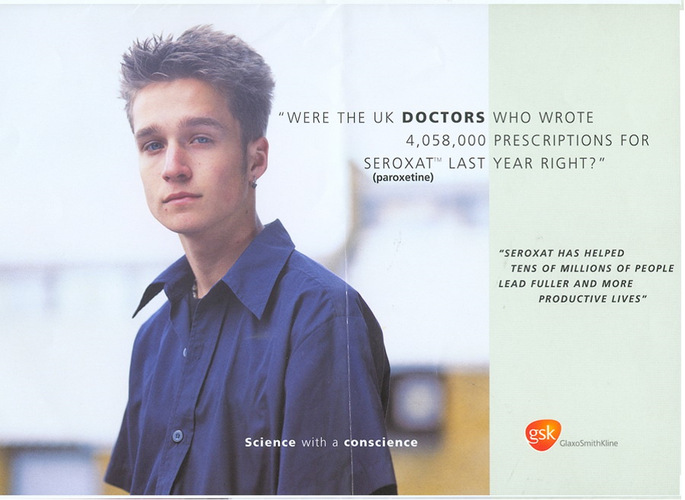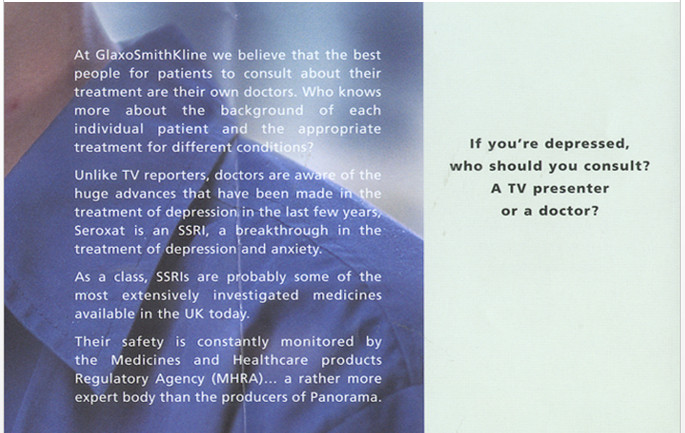
In addition to hosting the Panorama programs and The Famous Grouse history of Study 329, Study329.org has a comprehensive timeline on the origins of concerns about the SSRIs and the risk of suicide – initially with Prozac and subsequently with Paxil – Seroxat.
The chronology is laid out year on year with key documents linked to many of these years. Click on the year, then click on any links – there is days worth of reading for anyone not familiar with the story.
The hope is to provide a comprehensive repository for anyone who wants to study SSRIs, RCTs and Study 329 in particular. If there are points you think we are missing and in particular if you have documents you think we are missing please comment below and if possible send documents. We will be able to add them to the list. The more people involved in telling the story the better.
Later this week, we will have a timelines on efforts to get Study 329 retracted and we will begin to present the data – the Clinical Study Reports and their Appendices.
Once the Restored Study has been published we will make our worksheets available containing the data along with the Reviews of the Article and our responses.

I had not seen this advertisement before. It is an absolute disgrace that they reference panorama and the Seroxat series (in a rather smug and sinister way if you ask me). And to top it off they put a picture of a young guy who could easily be a teenager.
Sickos..
Whoever put this advertisement together should be ashamed..
Horrible..
This was internal marketing for GS; encouragement & praise for all who work for the company slogan: “Science with a conscience”. I think it would be interesting to locate and contact the young *models* in these company morale boosting adverts and interview them. I doubt they would be happy to know they were used to keep GSK co. employees from questioning the scientific evidence that was a threat to their empire.
Yes I agree..
also it would be interesting to know what age the guy is in the photo.. because I believe it was shortly after this internal PR campaign for Seroxat that GSK were forced to change the labeling and it was also banned for use in under 18’s..
I’m looking forward to reading the restored study. Will it be open access, or will it require a fee or subscription?
Open Access – will be available on Study329.org
DH
A little round up from the bush telegraph.
GlaxoSmithKline scraps sale of old drugs……
http://www.telegraph.co.uk/finance/newsbysector/epic/gsk/
There seems to be some confusion as to who are the bunch of amateurs..
Thank you for Study329.org and looking forward to Timelines.
Truthman is right. How utterly disrespectful and arrogant GSK are. I think that advert says it all about the smug, self absorbed, arrogant and inhumane bastards that are running it.
Lisa,
These are internal GSK morale boosting posters. They reflect pure genius in the realm of marketing. Well honed tools employed by “self absorbed, arrogant and inhumane bastards”- true, I grant you- this is the same genius that produced the direct to consumer ads in the U.S. , which gave Pharma a decisive advantage over the most skeptical medical professionals. Maybe a lesson here?
FWIW, a page from Aaron Swartz’s playbook demonstrates a fascinating approach to challenging evil genius, of the calibre exhibited by GSK. When noting the key points of events leading to an under the radar passing of very sketchy legislation, Aaron says :”Whoever was behind this was good– real good”. It can be gleaned from the methods that were activated and inspired by Aaron and those in his camp, that they led with the same tactics; that is employing provocative phrasing that hooked their audience. And like experts at marketing, they proceeded to resonate with a wide audience. There was a stronger emphasis on the benefits of a non-regulated internet, than on the nefarious purposes and the evil genius behind the SOPA bill.
It is in our nature, as human beings, to be more passionate when fighting for something than against it. These GSK *leaked* internal posters or memos, are examples of this. Their strategy was to reinforce the concept of excellence , superior work being done by GSK. They did not directly attack the Panorama programs, but simply reassigned them to a lower status than GSK. Clearly this worked well for GSK, otherwise they may have had whistleblowers by the thousands and walk outs on a scale large enough to put them out of business.
Another jewel from the victory of Demand Progress, which was the genius of Aaron Swartz. Clearly, there was no way his small group could compete with the wealth of those who were *real good* at pushing legislation crafted to benefit themselves at our expense. Wealth, power, and status were not the weapons employed to defeat this bill. Demand Progress strategized with a well proven marketing strategy- resonating with those who value and depend upon an unrestricted internet. This was the grassroots group that developed a message that resonated with the public.
How do we generate wide spread public interest in turning the tide against the evil genius of companies like GSK? I think we need to become better at the strategy that has served them so well.
Thanks for that Katie. Very well explained and interesting.
I suppose its like GSK are in a bubble, a fake world where theyve made it ok … more than ok to do what they do.
Well look at this: Apparently a bunch of investment funds have signed off on the AllTrials call to get all trials registered and all results reported:
http://www.alltrials.net/news/pharma-company-investors-call-for-clinical-trials-transparency/
Wonder what you think of this? I hate to be a knee-jerk cynic, but when one of these investors pushes for disclosure of bad news on an On-Patent drug they have invested in, then I will be impressed — not before.
Until then, this doesn’t raise my opinion of Wall Street so much as it lowers my assessment of what AllTrials is achieving …
Interesting link. The focus is on the reputation of the pharmaceutical companies. The message is that they need to man up and give up their data, to preserve the reputations that the investors have banked on?
The timing is interesting, too. Is the truth about the actual results of Study 329 a matter of tarnishing reputations ? Well, maybe in the business world, this is a major concern.
If the real message is well articulated; that Study 329 is a template for scrutinizing the effect of business mentality on health care, then the focus has to shift to the harm that was knowingly inflicted on the most vulnerable patients, children.
I cannot imagine an investor who would push for disclosure of more bad news–. At least not before he has reinvested in an equally lucrative business– And– what business could actually compete on that basis?
It would be a first, that’s for sure. When have those without conscience been the ones to sacrifice themselves to save all humanity?
They sure are good at putting up the appearance of being heroes. You have to give them credit for that much.
It’s more stinking bullshit. What you don’t see is any concern for the human cost that is already playing out tragically across whole societies. Talk about extreme denial of what’s currently taking place. They’re simply saying, “Hey pharma, your underwear is starting to sag and we’re not going to be seen walking down the street with you unless you make yourselves look presentable.” Their sole concern is for their own financial/reputational well-being while conveniently stepping over decades of carnage. It’s maddeningly similar to GSK’s nauseating internal adverts.
David
What date were those adverts? Did they appear in the UK – BMJ/Pulse etc? Just wondering what form the counter offensive to the re-published study will take….probably now social media? GSK has been very busy recasting itself as the humane face of medicine in The Guardian – running small banner adverts, which don’t look like adverts, and with the tiniest logo possible – malnourished children in Africa, whom GSK is saving from malaria via a new drug … I personally don’t think the paper should be publishing advertising that doesn’t look like sales marketing, and whose source is deliberately obscure. I guess to make readers feel subliminally warm towards GSK… might take it up with the paper.
The website is terrific.
Get reading guys and gals…
http://study329.org/timelines/
Their time is up on Timelines
Thank you